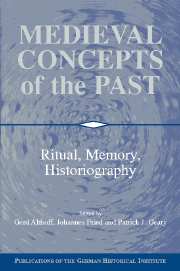Book contents
- Frontmatter
- Introduction
- 1 Authority and Legitimation of Royal Policy and Action: The Case of Henry II
- 2 King Henry II of Germany: Royal Self-Representation and Historical Memory
- 3 The Variability of Rituals in the Middle Ages
- 4 Rebels and Rituals: From Demonstrations of Enmity to Criminal Justice
- 5 Oblivion Between Orality and Textuality in the Tenth Century
- 6 Text and Ritual in Ninth-Century Political Culture: Rome, 864
- 7 The Concept of Time in the Historiography of the Eleventh and Twelfth Centuries
- 8 Constructing the Past by Means of the Present: Historiographical Foundations of Medieval Institutions, Dynasties, Peoples, and Communities
- 9 Topographies of Memory: Center and Periphery in High Medieval France
- 10 Challenging the Culture of Memoria: Dead Men, Oblivion, and the “Faithless Widow” in the Middle Ages
- 11 Artistic and Literary Representations of Family Consciousness
- 12 The Strange Pilgrimage of Odo of Deuil
- 13 The Rhineland Massacres of Jews in the First Crusade: Memories Medieval and Modern
- 14 The Martyr, the Tomb, and the Matron: Constructing the (Masculine) “Past” as a Female Power Base
- Index
6 - Text and Ritual in Ninth-Century Political Culture: Rome, 864
Published online by Cambridge University Press: 05 January 2013
- Frontmatter
- Introduction
- 1 Authority and Legitimation of Royal Policy and Action: The Case of Henry II
- 2 King Henry II of Germany: Royal Self-Representation and Historical Memory
- 3 The Variability of Rituals in the Middle Ages
- 4 Rebels and Rituals: From Demonstrations of Enmity to Criminal Justice
- 5 Oblivion Between Orality and Textuality in the Tenth Century
- 6 Text and Ritual in Ninth-Century Political Culture: Rome, 864
- 7 The Concept of Time in the Historiography of the Eleventh and Twelfth Centuries
- 8 Constructing the Past by Means of the Present: Historiographical Foundations of Medieval Institutions, Dynasties, Peoples, and Communities
- 9 Topographies of Memory: Center and Periphery in High Medieval France
- 10 Challenging the Culture of Memoria: Dead Men, Oblivion, and the “Faithless Widow” in the Middle Ages
- 11 Artistic and Literary Representations of Family Consciousness
- 12 The Strange Pilgrimage of Odo of Deuil
- 13 The Rhineland Massacres of Jews in the First Crusade: Memories Medieval and Modern
- 14 The Martyr, the Tomb, and the Matron: Constructing the (Masculine) “Past” as a Female Power Base
- Index
Summary
By the reigns of Charlemagne's grandsons, the ritual repertoire we have come to associate with the monarchy of the high Middle Ages was well established. Its emergence owed much to competition, first to the eighth century need to affirm a new dynasty, second to rivalry with the Roman Empire in the East, and third to the intrafamilial struggles that exploded in the 830s. For these reasons, the second half of the ninth century provides a wonderful window through which to observe the workings of a specific political culture and, especially, its rituals. Competing entities - Carolingian subkingdoms but also the Republic of Saint Peter - strove for autonomy as well as for the satellization or absorption of one another. At the same time they spoke in the language of power that a now waning Carolingian unity had made uniform. Each entity produced a historiography that argued its ruler’s superiority but at the same time was interested in and informed about its neighbors. Convergent and divergent, the contents of the so-called Annals of Fulda, Annals of Saint Bertin, Liber pontificalis, and papal epistolary registers are quite revelatory. But what exactly do they reveal? Not necessarily what actually happened. I shall not embark on such a difficult quest here, but rather focus on the role of rituals, especially “bad rituals,” in written narratives. Such a focus, I argue, can lead us to tangible realities in ninth-century political culture.
- Type
- Chapter
- Information
- Medieval Concepts of the PastRitual, Memory, Historiography, pp. 123 - 138Publisher: Cambridge University PressPrint publication year: 2002
- 1
- Cited by



